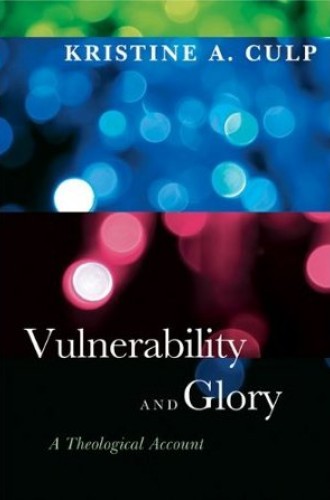Open to transformation
Kristine A. Culp has produced a sophisticated, original and timely work of constructive theology. It also happens to be a great story—even a page-turner. As with most great stories, its action revolves around an ambiguous and compelling protagonist. Here, though, the protagonist is not an important person but an anthropological entity: vulnerability. Human vulnerability, Culp argues, renders us open to infiltration by all the threats and harms that attend human life—contagion, weakness, error, torture, persecution, sickness, suffering and death—but it also lends humanity the capacity for transformation and hence for bearing God's glory.
Culp's disinclination to harden vulnerability into something more recognizably negative (weakness, for example, or suffering) is foremost among the book's many strengths, for it allows Culp to tell the story of how theologians have sought to offset ambiguous vulnerability with something more reliable and solid. Often, she suggests, this theological impulse has resulted in a bifurcated ecclesiology, with the church existing in two versions: a changeable church vulnerable to persecution, error, scandal and history and a reliable, steadfast church immunized against such forces. Naturally this dynamic unfolds differently depending on whether one is talking about Paul, the Donatists, Augustine, Luther, Calvin, Brunner or Ruether, to name but a few of the figures Culp treats with nuance and clarity. It also plays out differently depending on whether the threat is torture, schism, heresy, corruption or institutional malaise. Culp's analysis sounds in both these registers, never becoming muffled by jargon or redundancy.
Read our latest issue or browse back issues.
This historical survey—which constitutes part one of the book—is almost worth the cover price. (My chief complaint after finishing Vulnerability and Glory was that I did not discover it in time to assign it to students, as part one is as good as any Protestant survey of ecclesiology I've seen.) But Culp has a more ambitious and constructive goal that is fully unfolded in parts two and three. There she constructs a theology of life before God in which human vulnerability is opened to transformation by God and thereby shows forth God's glory.
It is in vulnerability—not in the flight therefrom—that God's glory is borne by persons and communities; which is to say, only in vulnerability is life before God possible. This is how life before God shows its itinerant, everyday character. Human vulnerability, after all, attaches to the ordinary business of eating and loving and growing old, forming and re-forming communities, trying to stay safe, yearning for the things one needs and (when they are found) expressing delight and gratitude. God's glory, Culp suggests, is shown in precisely these same dimensions and specifically in transformation.
The most sequential minds might find themselves temporarily disoriented by a slight shift in strategy here. Whereas part one is a straightforward historical account, parts two and three are analytical. Culp gently places examples of vulnerability—including those that veer into the most profound suffering, such as torture and rape—alongside theological reflection, biblical study and insights from social science. If one expects these evocations to yield a theological summation on the meaning of vulnerability, one will find that. Culp is, after all, making a case that Christians should resist the theological impulse to withdraw from vulnerability.
But if I have read her work correctly, she includes the more evocative elements of the book not simply to support her logical argument, as though examples of suffering are somehow redeemed if she can show them to have an unassailable theological payoff. Indeed, I gather that this is precisely what we are meant to question. Culp wisely stops short of valorizing suffering, for this would be exactly the kind of flight from vulnerability that she cautions against. Instead, drawing on the work of Elaine Scarry and others, Culp draws attention to instances of vulnerability that come to a tragic end in order to give words to and theologically remember such suffering.
It would be interesting to read Vulnerability and Glory alongside Sarah Coakley's Powers and Submissions, Marva Dawn's Powers, Weakness, and the Tabernacling of God or Margaret R. Miles's Desire and Delight—or, for that matter, the works of Simone Weil, Elie Wiesel or Johann Baptist Metz. It would have been worthwhile for Culp to include Metz and the Anabaptists of the Radical Reformation as interlocutors. But that is only a quibble. Culp's book is a fresh contribution to constructive theology, written in a style as nuanced as it is engaging.







